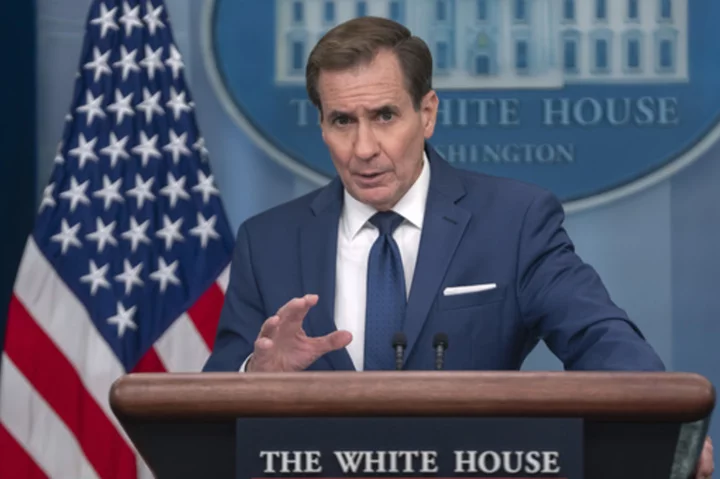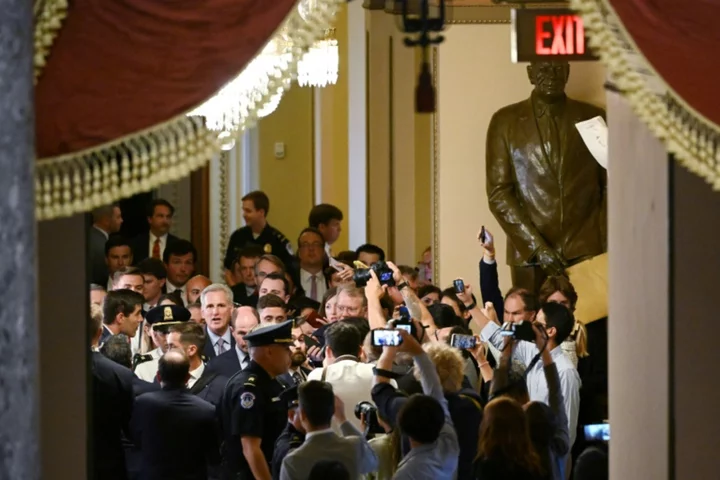WASHINGTON (AP) — The White House said Tuesday that “prudent contingency planning” is underway to evacuate Americans from the Middle East in case the Israel-Hamas war spreads into a broad regional conflict.
White House National Security Council spokesman John Kirby stressed there are currently no “active efforts” to evacuate Americans from the region beyond charter flights the U.S government began operating earlier this month out of Israel.
“It would be imprudent and irresponsible if we didn’t have folks thinking through a broad range of contingencies and possibilities,” Kirby said. “And certainly evacuations are one of those things.”
The White House addressed the contingency plans amid growing concerns that the 18-day-old Israel-Hamas war could further escalate. The U.S. has advised Israel that postponing a possible ground invasion of Gaza could be helpful as the U.S. and other partners in the region try to secure the release of more than 200 hostages who were captured in the Oct. 7 attack on Hamas soil. The contingency planning was first reported by The Washington Post.
President Joe Biden and Saudi Arabian Crown Prince Mohammed bin Salman spoke by phone on Tuesday about the deteriorating situation. It was the two leaders' first interaction since before the Hamas attack on Israel.
Biden and the crown prince spoke about “efforts to deter state and non-state actors from widening the conflict between Israel and Hamas,” according to the White House. Biden administration officials have repeatedly warned Iran not to become involved in the conflict. U.S. forces in the region over the last few days have come under repeated attacks that the Pentagon has said were likely endorsed by Iran, which is the chief sponsor of Hamas, the Hezbollah militant group in Lebanon, as well as militant groups in Iraq and Yemen.
“The two leaders agreed on pursuing broader diplomatic efforts to maintain stability across the region and prevent the conflict from expanding,” the White House added.
At the Pentagon, Brig. Gen. Pat Ryder said the U.S. is preparing for an increase in violence, noting that there have already been at least 13 attacks against troops and installations in Iraq and Syria.
“What we are seeing is the prospect for more significant escalation against U.S. forces and personnel across the region in the very near term coming from Iranian proxy forces and ultimately from Iran,” said Ryder, the Pentagon's press secretary.
He added that the U.S. won’t hesitate to take action if needed to protect its forces and interests in the region.
Biden said last week he believed that Hamas was motivated to attack Israel in part by a desire to stop that country from normalizing relations with Saudi Arabia.
“One of the reasons ... why Hamas moved on Israel, is because they knew I was about to sit down with the Saudis,” Biden said at a campaign fundraiser. The U.S. president said he thinks Hamas militants launched their deadly assault on Oct. 7 because “guess what? The Saudis wanted to recognize Israel” and were near being able to formally do so.
An agreement, which the White House says it continues to pursue, would be a feat of diplomacy that could have enabled broader recognition of Israel by other Arab and Muslim-majority nations that have largely opposed Israel since its creation 75 years ago in a territory where Palestinians have long resided.
But talks were interrupted after Hamas militants stormed from the blockaded Gaza Strip where Palestinians live into nearby Israeli towns.
Israel sealed off Gaza in response, and Biden told reporters in Washington on Tuesday that humanitarian aid into the territory wasn't arriving fast enough.
Gaza’s 2.3 million people have been running out of food, water, fuel and medicine. The aid convoys allowed into Gaza so far have carried a fraction of what’s needed.
The president made his comments to reporters about the speed of aid flowing into Gaza after presenting science and technology awards to several Americans for exemplary achievements that have had a positive impact on the United States.
One of the recipients, Sheldon Weinbaum of the City College of New York, wore a “Stop War” button on his suit coat lapel as he received his medal from Biden.
Biden suggested the ceremony was a welcome break from the grim news coming out of the Middle East.
“This is a happy occasion," Biden said at the start of the White House ceremony. "We need some more happy occasions.”
The war is the deadliest of five Gaza wars for both sides. The Hamas-run Health Ministry said at least 5,791 Palestinians have been killed and 16,297 wounded. In the occupied West Bank, 96 Palestinians have been killed and 1,650 wounded in violence and Israeli raids since Oct. 7.
“This is war. It is combat. It is bloody, it is ugly, and it’s going to be messy,” Kirby said. “I wish I could tell you something different. I wish that that wasn’t going to happen.”
Ryder said several new force protection measures are now underway, including the deployment of air defense systems. He said a Terminal High Altitude Area Defense (THAAD) battery and additional Patriot missile battalions have begun to move to undisclosed locations in the Middle East.
The THAAD is being sent from Fort Bliss, Texas, and the Patriot battalions are from Fort Liberty in North Carolina and Fort Sill in Oklahoma.
Ryder also said that additional forces have moved into the Middle East. He said the New Jersey Air National Guard’s 119 Expeditionary Fighter Squadron, with its F-16 fighter jets, arrived on Tuesday, but officials would not say where exactly it went.
___
Find more of AP’s coverage at https://apnews.com/hub/israel-hamas-war









